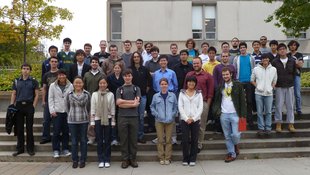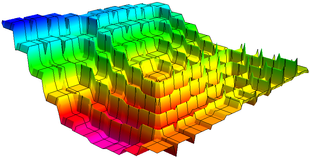10-327/Homework Assignment 8 Solutions: Difference between revisions
No edit summary |
No edit summary |
||
| (One intermediate revision by one other user not shown) | |||
| Line 20: | Line 20: | ||
-Kai [[User:Xwbdsb|Xwbdsb]] 07:32, 19 December 2010 (EST) |
-Kai [[User:Xwbdsb|Xwbdsb]] 07:32, 19 December 2010 (EST) |
||
I think the set of homeworks is a finite point set, hence automatically compact ... if you view the homeworks as spaces instead of points, then the resulting product space is complete if each homework is complete, as we know ... exercise: (a) is the converse also true? (b) what about infinite products? |
|||
-The resulting product space is complete only if you put that weird metric that induces the product topology. When the space is not metric we cannot talk about completeness. Converse depends on what kind of metric you define on the projection? countable infinite product is done in the book. It is complete with that weird metric induced from metrics from all the spaces.-Kai |
|||
Anyway, here is another solution set, this one typed (though not graded, so use at your own risk): [[User:Bcd|Bcd]] 14:40, 19 December 2010 (EST) |
|||
[http://katlas.math.toronto.edu/drorbn/index.php?title=Image:10-327-HW8.pdf] |
|||
Latest revision as of 17:53, 19 December 2010
| ||||||||||||||||||||||||||||||||||||||||||||||||||||||||||||
In order to make our topological space of homework assignments complete, I need to upload the solution to the last assignment.(Sorry for getting so busy and keep forgetting things) What metric we should put on it?...Its quite difficult to create a complete space...
page1 page2 page3 page4 page5 page6 page7 page8 page9 page10 page11 page12 page13 page14 page15 page16
-Kai Xwbdsb 07:32, 19 December 2010 (EST)
I think the set of homeworks is a finite point set, hence automatically compact ... if you view the homeworks as spaces instead of points, then the resulting product space is complete if each homework is complete, as we know ... exercise: (a) is the converse also true? (b) what about infinite products?
-The resulting product space is complete only if you put that weird metric that induces the product topology. When the space is not metric we cannot talk about completeness. Converse depends on what kind of metric you define on the projection? countable infinite product is done in the book. It is complete with that weird metric induced from metrics from all the spaces.-Kai
Anyway, here is another solution set, this one typed (though not graded, so use at your own risk): Bcd 14:40, 19 December 2010 (EST)

